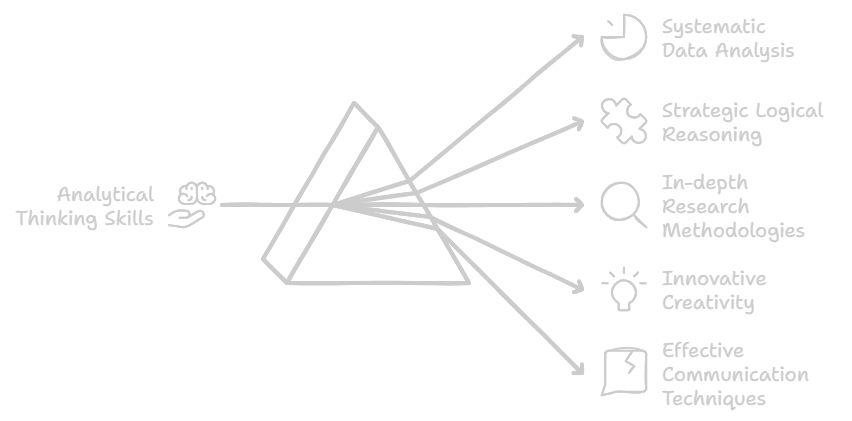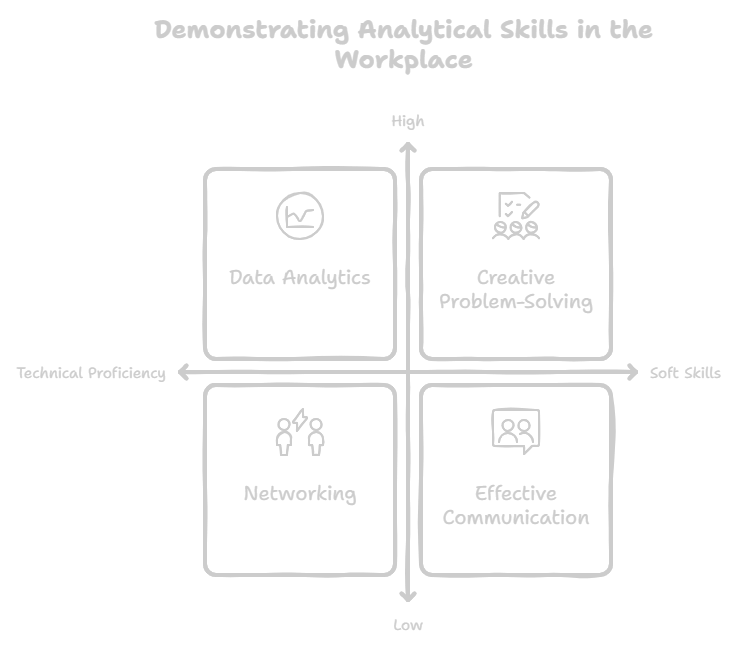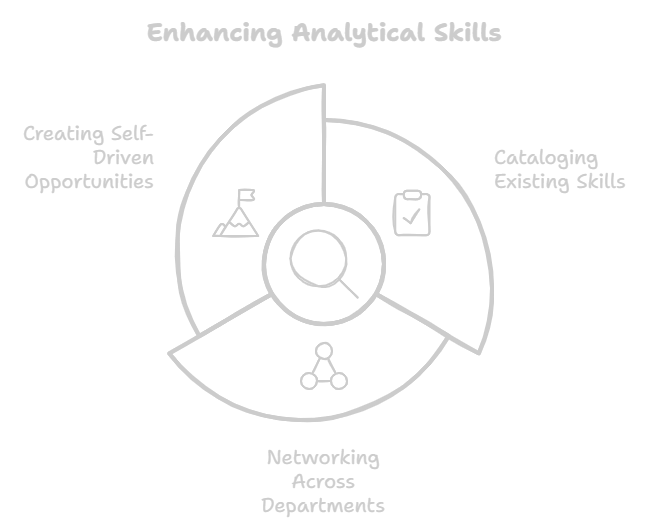Boost Your Analytical Thinking Ability
Do you struggle with solving problems or making decisions? Developing your analytical thinking ability can help. It involves gathering and evaluating information, solving problems, and making sound decisions.
This article will explore how to boost your analytical thinking and why it’s essential for personal and professional growth. Whether you are a student, professional, or looking to enhance your cognitive skills, improving your analytical thinking can positively impact your life.
Understanding Analytical Thinking
Systematic data analysis helps improve analytical thinking. It enables individuals to evaluate and interpret information, make informed decisions, solve problems, and identify patterns and trends.
For example, marketing professionals use data analysis to understand customer behavior and preferences, allowing them to create data-driven marketing strategies.
Strategic, logical reasoning is also essential for enhancing analytical skills. It helps individuals assess and process information in a structured, rational manner. In fields such as law, lawyers apply strategic, logical reasoning to build a compelling case based on evidence and facts.
In-depth research methodologies contribute to improving analytical thinking. They foster a deeper understanding of complex issues and facilitate evidence-based decision-making. For instance, medical researchers use in-depth research methodologies to analyze clinical data and draw conclusions that can lead to advancements in medical treatments and patient care.
Essential Analytical Thinking Skills for Professional Success

Systematic Data Analysis
Systematic data analysis involves several key steps.
- Identifying the data sources.
- Collecting and organizing the data.
- Processing and analyzing the data.
This process allows individuals to gain valuable insights and identify patterns and trends that can inform decision-making processes.
Systematic data analysis plays a crucial role in problem-solving and decision-making processes.
It provides objective and factual information.
By leveraging data analytics, individuals can:
- Identify root causes of issues
- Explore potential solutions
- Make informed decisions based on evidence rather than assumptions.
To ensure accuracy and reliability, individuals can:
- Cross-reference data from multiple sources
- Perform thorough quality checks
- Validate findings with subject matter experts
- Maintain transparency and document the data analysis process.
Following these strategies can enhance the quality and reliability of analytical insights.
Strategic Logical Reasoning
Strategic, logical reasoning helps in problem-solving at work. It allows individuals to tackle complex issues step by step.
For instance, when a marketing team faces dropping sales, strategic logical reasoning helps them find the reasons, study market trends, and develop data-driven solutions.
During job interviews, people can show their soft analytical skills by sharing technical skills and explaining how they solve problems.
For example, a data analyst applicant can discuss using data analytics to gain useful insights and make smart business decisions.
Knowing your analytical skills and finding ways to improve them is essential to stay competitive in today’s job market. Recognizing strengths and weaknesses helps you focus on improving.
For instance, practicing problem-solving and playing brain games can help professionals improve their analytical thinking and adapt to changing job needs.
In-depth Research Methodologies
In-depth research involves several important steps: data collection, analysis, interpretation, and conclusion. Accurate data collection is crucial for gathering relevant information. Analyzing and interpreting the data provides a deeper understanding of the subject, leading to meaningful conclusions. These steps are essential for reliable and valid research findings.
Research methodologies can be used in various fields. In healthcare, qualitative and quantitative methods can study patient outcomes. In marketing, consumer surveys and data analysis can identify market trends. Each industry can customize these methodologies to fit their specific needs.
Effective research techniques include literature reviews, interviews, focus groups, and surveys. These help gather data, gain insights, and evaluate findings. Statistical analysis software can also be used to ensure accuracy and reliability. These techniques are vital for producing high-quality research outcomes.
Innovative Creativity and Problem Solving
In professional settings, creativity can be used to solve problems. Employees can think of new ideas and explore different solutions to challenges.
To foster innovative thinking, companies can encourage collaboration, hold brainstorming sessions, and create a supportive work environment. Successful applications of innovative creativity include developing new products, improving processes, and creating unique marketing strategies. This has led to increased productivity, customer satisfaction, and a competitive edge.
Effective Communication Techniques
Communication is essential for professional success. Listening, using clear language, and asking questions are all valuable skills. Good communication in the workplace can help with problem-solving and collaboration. You can demonstrate your communication skills on your CV or during interviews by sharing examples of successful teamwork, presentations, or projects. You can also discuss how good communication led to successful outcomes in previous roles.
Mastering communication is essential for highlighting analytical thinking and improving professional success.
Application of Analytical Skills in the Workplace

Displaying Technical Analytical Proficiency
Individuals can demonstrate their problem-solving skills by demonstrating how they use analytical tools to solve complex problems. For example, they can discuss using data analytics to find trends or logical thinking and research to develop new solutions.
To demonstrate soft analytical skills on a CV, individuals can mention specific projects where they applied analytical skills. This could include showing creativity and communication through completing a data analysis project or demonstrating logical thinking in solving a problem.
To improve their technical, analytical skills, individuals can network across different departments to find new projects that require analytical skills. Working with colleagues from diverse areas can help them learn different analytical techniques and tools and showcase their technical and analytical skills.
Articulating Your Problem-Solving Process
When solving a problem, individuals can follow specific steps to explain their process. They start by defining the problem and gathering information to identify key issues. Then, they brainstorm potential solutions and choose one, explaining their decision.
To show problem-solving skills on a CV or in interviews, individuals can give examples of past projects where they used these skills. They can also demonstrate proficiency in analytical tools and share how they used data analytics, research, and critical thinking to solve problems. This helps convey their analytical thinking skills to potential employers.
Highlighting Soft Analytical Abilities on Your CV
To highlight soft analytical abilities on a CV, individuals can provide practical examples of problem-solving. This can include using analytical thinking, such as data analytics, logical thinking, research, creativity, and effective communication.
To demonstrate their abilities further, they can showcase relevant projects and technical skills. In interviews, they can explain problem-solving skills and provide specific examples of how they’ve used analytical thinking in previous roles or projects.
Individuals can benefit from strategies such as practicing problem-solving skills, being observant, understanding how things work, asking questions, and actively reading books to enhance their analytical skills. These can help develop and hone their analytical thinking abilities.
Demonstrating Soft Analytical Competencies During Interviews
During interviews, it’s crucial to show soft analytical skills. Candidates can demonstrate their logical reasoning and problem-solving abilities by sharing examples of using analytical thinking in previous work experiences. For instance, they can talk about analyzing complex data to find patterns and trends that led to successful project outcomes.
They can also highlight their research methods by explaining how they gathered and analyzed data for a project, emphasizing the role of thorough analysis in decision-making.
In a professional setting, it’s crucial to communicate analytical thought processes and findings effectively. Candidates can explain the steps they took to reach a conclusion and the implications of their analysis. They can also share examples of how they presented their findings to a team or client, showing their ability to communicate complex information clearly and concisely.
Enhancement Techniques for Analytical Skills

Cataloging Your Existing Analytical Skill Set
The first step is to list the analytical skills you have. This could include data analysis, logical reasoning, research, creativity, and communication. Look back at your work experiences for specific examples of using these skills. For instance, you might have used data analysis to find patterns, used logical reasoning to solve problems, conducted research for decision-making, showed creativity in solutions, and communicated findings to others.
By writing down these examples, you can demonstrate your analytical and problem-solving skills in job applications. This will not only show your abilities but also demonstrate the value you can bring to employers.
Networking across Different Departments
One way to improve analytical skills is by networking across different departments. This exposes individuals to diverse perspectives and ideas, broadening their analytical mindset. Collaborating with colleagues from various departments can provide valuable insights and approaches to problem-solving.
Networking across different departments also allows for the exchange of knowledge and expertise. This provides opportunities to learn new analytical techniques and strategies from others. Actively seeking out cross-departmental projects, participating in interdisciplinary team meetings, and engaging in knowledge-sharing activities can help improve analytical thinking and problem-solving abilities.
By building relationships and networks with colleagues from different departments, individuals can facilitate the exchange of analytical skills and expertise. This can contribute to professional growth and career advancement by providing visibility and recognition within the organization.
Strong analytical abilities in cross-departmental collaborations can lead to career advancement opportunities, including leadership roles or specialized projects requiring strong analytical thinking and problem-solving skills.
Creating Self-Driven Opportunities for Skill Growth
Individuals can improve their analytical thinking and problem-solving skills by:
- Taking courses, workshops, or certifications related to data analytics, logical thinking, and research.
- Self-assess their current skills and identify areas for improvement.
- Setting measurable goals to track their progress.
- Actively participating in cross-functional projects and attending interdisciplinary team meetings.
- Seeking mentorship from colleagues with strong analytical abilities.
Creating a portfolio of previous projects that required critical thinking and problem-solving can also help identify areas for improvement and development.
The Impact of Analytical Skills on Your Career Trajectory
Having good analytical skills has made a big impact on their career. It helps them solve problems and make decisions better. By using skills like logical thinking, data analytics, and problem-solving, they’ve been able to help their team and company more. This has led to more success and moving up at work.
They’ve shown their analytical skills when applying for jobs by explaining technical tools and problem-solving, which has helped them in their careers.
To get better at analytical skills, people can:
- Pay attention to things
- Read books actively
- Practice problem-solving
- Think carefully about decisions
By doing these things, they can improve their analytical skills and have better career opportunities.
Reasons Analytical Thinking is Critical for Job Performance
Systematic data analysis helps professionals identify trends, patterns, and correlations in large datasets. This leads to informed decision-making and problem-solving.
Logical reasoning impacts professional success by fostering a structured approach to decision-making. It allows individuals to evaluate multiple options, assess potential outcomes, and choose the most effective course of action.
In-depth research methodologies are essential for job performance. They enable individuals to gather comprehensive and accurate information, conduct thorough analyses, and make well-informed recommendations to drive business growth and innovation.
A Roadmap to Advance Your Analytical Capabilities
Individuals can improve their analytical capabilities using data analytics, logical thinking, and research. These methods help extract valuable insights and make informed decisions. Effective networking across different departments is essential, as it provides exposure to diverse perspectives and experiences, enhancing problem-solving and decision-making.
Analytical skills are essential for career growth and job performance, enabling individuals to approach challenges strategically. Demonstrating solid analytical skills in job applications showcases critical thinking and problem-solving ability, impacting professional development.

Vizologi is a revolutionary AI-generated business strategy tool that offers its users access to advanced features to create and refine start-up ideas quickly.
It generates limitless business ideas, gains insights on markets and competitors, and automates business plan creation.


